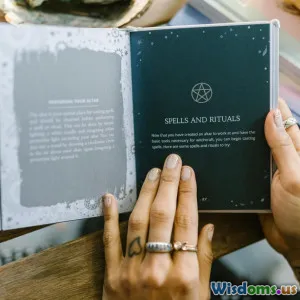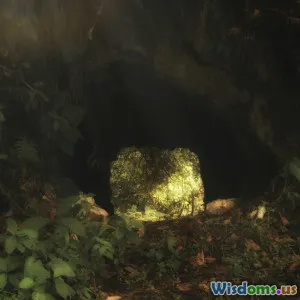
Pros and Cons of Joining Online Occult Learning Groups
9 min read Explore unique benefits and challenges of online occult learning groups for seekers in today’s digital world. (0 Reviews)
Pros and Cons of Joining Online Occult Learning Groups
The mystical worlds of occult teachings have intrigued humanity for centuries, hidden traditionally behind closed doors and ancient texts. Recently, with the proliferation of digital connectivity, these esoteric teachings have migrated en masse to online platforms. The allure of anonymous chats, communal rituals, and vast learning resources accessible at one’s fingertips presents a tempting call to spiritual seekers and curious minds alike.
However, before diving headfirst into the virtual realms of occult learning, it's essential to weigh the rewards and risks carefully. This article takes you deep into the pros and cons of joining online occult learning groups, arming you with insights and considerations to approach these unique communities with both open-mindedness and discernment.
The Rise of Online Occult Communities
Historically, occult knowledge was transmitted through personal mentorships, secretive societies, or rare manuscripts. The internet’s decentralizing power has transformed access dramatically:
- Democratization of Access: No longer limited to a select initiated few, anyone with internet access can explore occult teachings ranging from Hermeticism to Wicca, astrology, or runic magic.
- Community Building: Online forums, Facebook groups, Discord servers, and specialized platforms let practitioners worldwide connect instantly.
- Multimedia Learning: Video tutorials, podcasts, digital books, and live workshops have enriched how occult knowledge is presented and absorbed.
Yet, these opportunities come wrapped in complexities worth understanding.
Pros of Joining Online Occult Learning Groups
1. Accessibility and Convenience
One of the most significant advantages is how easy it is to access occult teachings online. Geography, time constraints, or limited local resources no longer fence in learners.
For example, a beginner curious about tarot reading can join groups like the "Biddy Tarot Community" online, accessing free lessons, reading challenges, and global insight exchanges without leaving home.
2. Diverse Perspectives and Traditions
Online groups often bring together practitioners from varying backgrounds and lineages. This diversity facilitates a broader understanding of occult systems beyond one's cultural or regional limitations.
Platforms such as Reddit’s r/occult host discussions ranging from alchemical symbolism to shamanic practices, encouraging cross-pollination of ideas that were hard to come by before the digital age.
3. Anonymity and Privacy
Occult practices sometimes still carry social stigma. Online anonymity allows seekers to explore sensitive or misunderstood paths without fear of judgment from local communities or employers.
This psychological safety net empowers more authentic inquiry, crucial for personal spiritual development.
4. Cost-Effectiveness
Many online occult learning groups offer free or affordable content compared to in-person seminars or private tutoring, which might demand significant financial investment and travel expenses.
5. Real-Time Feedback and Community Support
Many platforms enable live Q&A sessions, chatrooms, and peer reviews. This interactive environment helps learners clarify doubts, share experiences, and stay motivated.
For instance, channels on platforms like Discord or Slack often feature moderators and seasoned practitioners who guide newcomers, preventing common missteps.
Cons of Joining Online Occult Learning Groups
1. Risk of Misinformation and Lack of Quality Control
Not all online groups maintain rigorous standards. Occult topics are particularly vulnerable due to their subjective nature and the prevalence of myths or scams.
Unverified teachings can lead to misunderstandings, misuse of rituals, or even psychological distress.
A notable example includes pervasive misinformation about spellcasting that promises guaranteed results, which undermines genuine practice and ethical considerations.
2. Overwhelming Volume of Information
The sheer abundance of conflicting ideas can confuse beginners. Without structured guidance, novices might find it challenging to discern foundational knowledge from fringe theories.
3. Lack of Personal Connection
While virtual interactions are convenient, they lack the palpable energy and mentorship depth of in-person gatherings, which many occult traditions value highly.
The communal rhythm of physical rituals or face-to-face apprenticeship can enrich learning and spiritual growth beyond the capabilities of screens and keyboards.
4. Privacy Concerns and Data Security
Sharing personal experiences, photos, or spiritual practices online opens doors to privacy breaches or even doxxing, especially in closed or secretive groups.
Sensitive topics like ancestral practices or identity can be exploited if platforms don't enforce strong security measures.
5. Potential for Toxicity or Manipulation
Just like any community, online occult groups can harbor gatekeeping, elitism, or charismatic individuals who exploit followers psychologically or financially.
Reports of online cult formations centered on occult themes illustrate this hazard — where boundaries between spiritual guidance and control blur dangerously.
Navigating Online Occult Learning Wisely
To optimize benefits while mitigating risks, prospective members can adopt these strategies:
-
Research Group Reputation: Prioritize well-moderated communities with transparent rules, credible references, and active, respectful members.
-
Cross-Validate Information: Use multiple sources and historic texts, consult seasoned practitioners offline where possible.
-
Protect Personal Data: Use pseudonyms, secure connections (VPNs), and limit sharing of sensitive info.
-
Balance Digital and Physical Practice: Blend your online learning with real-world rituals or mentoring when feasible to deepen your experience.
-
Maintain Critical Thinking: Skepticism prevents credulity; engage with teachings thoughtfully without chasing quick results.
Conclusion: Empowerment Through Informed Choice
Joining online occult learning groups presents an unprecedented opportunity for spiritual explorers worldwide to connect, learn, and evolve. However, these virtual societal niches require informed navigation to avoid pitfalls like misinformation, privacy erosion, and toxic dynamics.
By understanding the pros – such as accessibility, diversity, and community – alongside the cons like risks of scams and lack of physical immersion, seekers can harness the digital age's benefits without compromising their well-being.
As with any profound journey, the key lies in empowerment through education, vigilance, and a measured balance of openness and caution.
If you are drawn to the mystical but uncertain whether online occult groups are right for you, consider these insights your compass. Whether as a casual investigator or a committed practitioner, approach these portals of ancient wisdom with both curiosity and care — and the ethereal realms may open in ways both transformative and safe.
References:
- "The Digital Occult: Social Media and Esoteric Practices," Journal of Contemporary Esotericism, 2021.
- Reddit r/occult community insights, 2023.
- Biddy Tarot Online Workshops - user testimonials, 2022.
- "Online Cults and Psychological Vulnerability," Psychological Review, 2019.
Author: An informed content creator passionate about the intersection of technology and spirituality.
Rate the Post
User Reviews
Other posts in Occult and Witchcraft
Popular Posts
















